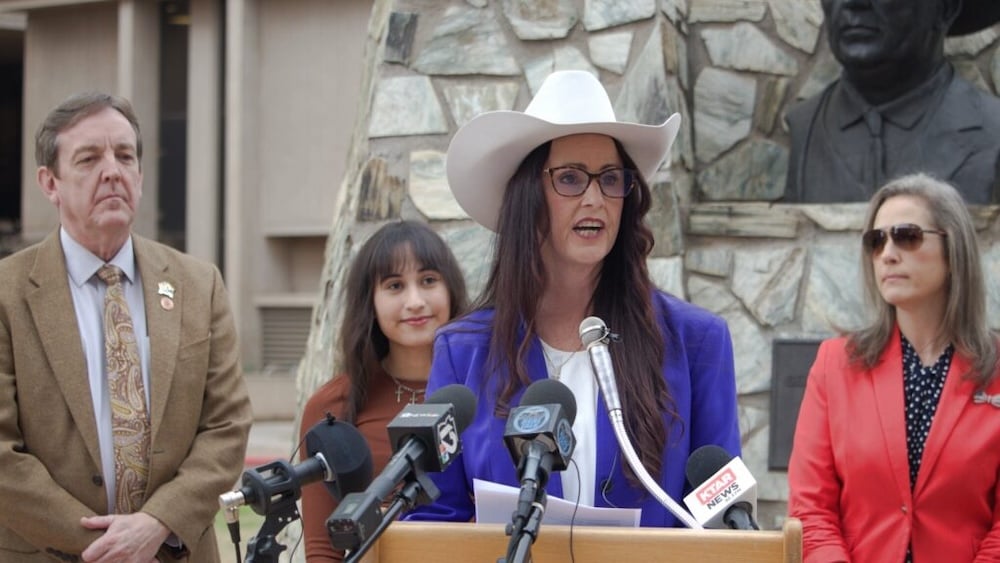
Arizona Republicans want hospitals and doctors to either provide or pay for the treatment of people who received gender-transitioning procedures and later regretted it, but LGBTQ advocates say the move is nothing more than an effort to further villainize trans health care.
The legislation would mandate that any health care institution or doctor who provides gender-affirming care also offer or pay for the medical care of those who later detransition. And insurance policies that cover gender-affirming care would also be required to cover detransition care.
Gender-affirming care seeks to support the gender identities of trans people. That can be done both via social acceptance measures, like using a person’s preferred pronouns or name, and through medical care that includes puberty blockers, hormone therapy and surgical procedures that better align a person’s physical body with their gender identity.
People who detransition, meanwhile, represent an extreme minority of the transgender experience. A 2015 survey from the National Center for Transgender Equality found that, out of nearly 28,000 respondents, only 8% reported having detransitioned at some point in their lives. And, of that percentage, the vast majority reported later transitioning again, and said their decision to detransition was attributable to external pressures.
Despite that, far-right politicians have latched onto detransitioners to justify their calls to curtail gender affirming care.
In a Thursday news conference, Sen. Janae Shamp, the sponsor of Senate Bill 1511, denounced gender-affirming care as a political ideology that harms patients. The Republican from Surprise, a former nurse, criticized doctors who provide the care for “butchering” children instead of helping them resolve mental health issues.
“(Doctors) take an oath to never intentionally do or administer anything to harm their patient,” Shamp
said. “We’ve turned away from these promises and we’ve turned towards harmful theories that guide judgment and suggest and administer life-altering irreversible surgeries and drugs.”
Shamp and her GOP colleagues were joined at the media conference by Chloe Cole, a frequent supporter of anti trans legislation in statehouses across the country who detransitioned after receiving a mastectomy at 15. At the time, the California native identified as a boy, and, she said, her parents were pressured into affirming her identity by doctors who warned them that not doing so would risk inspiring suicidal thoughts.
“My doctors, with their gender theories, thought all my troubles would go away as soon as I was transformed into something that vaguely resembled a boy,” Cole said in an emailed statement. “Their theories were wrong. I now have two giant scars across my chest that remind me every day that I was butchered by the institutions that we all thought we could trust.”
Transgender health care, especially for minors, has been a target for Republican lawmakers across the country in recent years.
In 2022, Arizona Republicans passed a ban on gender-affirming surgeries for patients under 18, framing it as a protection for children from irreversible change. The law originally sought to outlaw puberty blockers and hormone therapy for minors – both of which have been backed by major medical associations as safe and necessary for the well-being of transgender people. But outrage and pushback from LGBTQ Arizonans resulted in a revision that removed those provisions.
Still, GOP lawmakers have continued to introduce measures to restrict those health care tools for minors since then, with no success. This year’s version would make it a misdemeanor for a doctor to prescribe a minor puberty blockers or hormone therapy without a parent’s written consent — despite the reality that parental involvement is a key part of a minor’s gender transition.
Cathryn Oakley, the senior director of legal policy for the Human Rights Campaign, the nation’s largest LGBTQ advocacy group, said the spotlight on detransitioners only acts as a vehicle to strip rights away from trans people.
“This bill is an unnecessary and gratuitous excuse to talk about detransition in an effort to shift the focus from the actual health care that transgender people receive, which is supported by every mainstream American medical health organization, to the care of a very small number of folks whose medical needs are already covered by health insurance,” Oakley said in an emailed statement.
Bridget Sharpe, the director of the HRC’s Arizona branch, told the Arizona Mirror that the care for people
who detransition is the same as the care for transgender people.
“Any medical service that affirms someone’s gender includes someone who decides to detransition,” she said. “If they decide to detransition they are affirming their gender.”
Much like gender-affirming care for transgender people, treatment to help people who have detransitioned may include social acceptance, such as using their preferred pronouns and names, or medical interventions like breast reconstruction surgery.
Instead of resolving a real issue, Sharpe said, the Republican legislation instead seeks to weaponize detransitioning against transgender health care.
And it’s not a new strategy, she added. Politicians have in the past invoked the voices of discriminatory groups like Gays Against Groomers to defend anti-drag legislation or used the testimony of people who previously identified as LGBTQ to advocate for the preservation of conversion therapy.
“This is a pretty normal tactic from any anti-LGBTQ elected official to find maybe the couple of folks who have had bad experiences and maybe decided to detransition — and again, that’s up to them — and use it as an example for every single transgender person in the country,” Sharpe said. “It becomes this sort of scare tactic and feeds into this disinformation machine that anti-equality elected officials have been feeding into for the past several years.”



